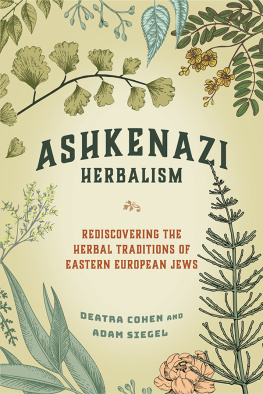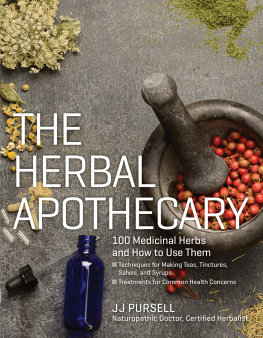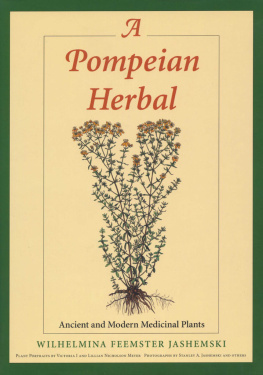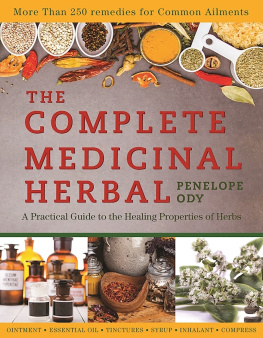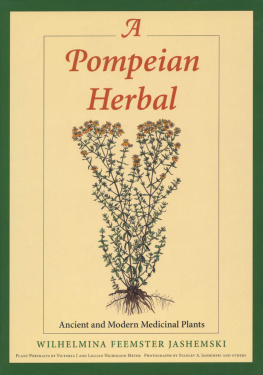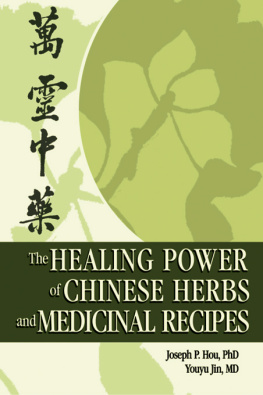
Praise for Ashkenazi Herbalism
A significant contribution to Jewish studiesCohen and Siegel have successfully resolved the mystery of Ashkenazi herbal traditions.
Marek Tuszewicki,
deputy director of the Institute of Jewish Studies, Jagiellonian University in Krakw and author of A Frog Under the Tongue
Cohen and Siegel have offered us a priceless jewel: a historical document of Jewish herbal heritage that blazes with life, revealing vital roots long buried in obscurity. . . . Ashkenazi Herbalismis an important addition to the canon of herbal literature, bequeathing to us a tradition of herbal practice that, but for their efforts, would have remained lost to the world.
Judith Berger,
writer, herbalist, and author of Herbal Rituals
A delightfully written and highly original work that sheds new light on a woefully understudied aspect of Eastern European Jewish folk culture. The common stereotype of shtetl life is that Jews were cut off from the natural environment that surrounded them. Cohens and Siegel's pioneering book reveals, by contrast, some of the ways in which Ashkenazi Jews in the Pale of Settlement and neighboring regions were deeply embedded in their local ecologies and possessed a rich heritage of herbal practices and knowledge.
Nathaniel Deutsch,
professor of history at the University of California, Santa Cruz and author of The Jewish Dark Continent
Meticulously researched and well written, Ashkenazi Herbalismis the fascinating account of the healing traditions and herbal medicine practiced by Eastern European Jews. . . . A brilliant work that captures an important but long-ignored facet of traditional herbal healing practices.
Rosemary Gladstar,
herbalist and author of Rosemary Gladstars Medicinal Herbsand Rosemary Gladstars Herbal Recipes for Vibrant Health
Reading Ashkenazi Herbalismis like finding a family heirloom you thought had been lost forever. . . . This book, full of rigorously researched ethnobotany and shtetl magic, is an answered prayer for those of us who have longed to reconnect with Ashkenazi folk healing traditions.
Dori Midnight,
community healer, herbalist, and educator who incorporates traditional healing practices and social justice in her work
Ashkenazi Herbalismexplores the local and exotic plants Eastern European Jews used as medicine. After a thorough discussion of Jewish medical practitioners, especially female folk healers, it draws on a wide range of sources to look at how plantsalphabetically from aloe to nutmeg to violetswere used in the Russian Jewish Pale of Settlement compared to other times and places.
Gabriella Safran,
Eva Chernov Lokey Professor in Jewish Studies at Stanford University and author of Wandering Soul
Ashkenazi Herbalismfascinates the reader with its deep detective work and thorough research of a healing tradition that was mostly lost by the horror and genocide of the Second World War, which destroyed Jewish communities and culture throughout Europe.. . . Thankfully, the authors have captured the Ashkenazi healing traditions that were practiced by itinerant Kabbalists, feldshers, and midwives so that these precious remnants of knowledge are not forgotten. Whether you are an avid herbalist, history buff, or plant lover, youll find something in this book to satisfy your soul. What a gift to us all.
Phyllis D. Light,
MA, herbalist and author of Southern Folk Medicine
[Cohens] deep dive into the past to bring forth the plant knowledge once practiced by the Ashkanazi people is a great contribution to future generations.
Pam Fischer,
executive director of the Berkeley Herbal Center
Copyright 2021 by Deatra Cohen and Adam Siegel. All rights reserved. No portion of this book, except for brief review, may be reproduced, stored in a retrieval system, or transmitted in any form or by any meanselectronic, mechanical, photocopying, recording, or otherwisewithout the written permission of the publisher. For information contact North Atlantic Books.
Published by
Next page
